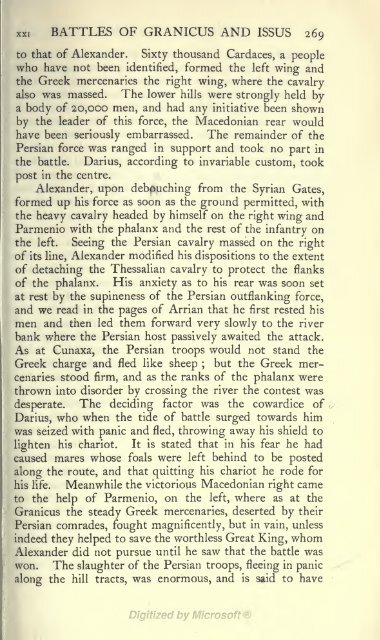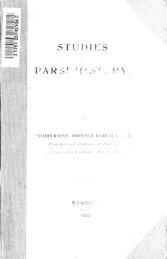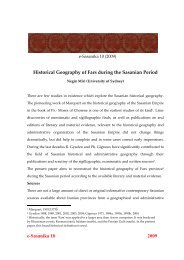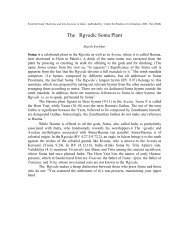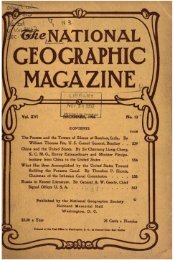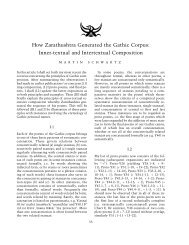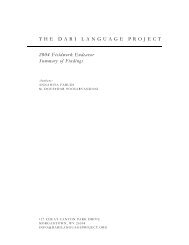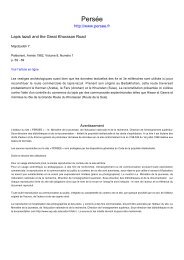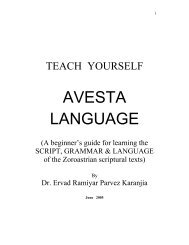- Page 1:
^'^ l*^ CD CO
- Page 7 and 8:
A HISTORY OF PERSIA
- Page 10 and 11:
^v^J-^' BAS-RELIEF OF CYRUS THE GRE
- Page 12 and 13:
x- !^ COPYRIGHT 111 v/,1
- Page 15 and 16:
Part of a Persian Hunting Scene. (F
- Page 17 and 18:
k A Sphinx. (Gold Medallion from Br
- Page 19 and 20:
CONTENTS B Kini Kingdom, 745-606 K
- Page 21 and 22:
N) CONTENTS xtii CHAPTER XIV The Pe
- Page 23 and 24:
CONTENTS XV CHAPTER XXI PACE The Ba
- Page 25 and 26:
^ CONTENTS xvii B.C.—The Battle o
- Page 27 and 28:
CONTENTS xix CHAPTER XXXV " ' PAGE
- Page 29:
CONTENTS xxi Literature—The Monar
- Page 32 and 33:
XXIV HISTORY OF PERSIA The Sleeping
- Page 34 and 35:
ii'} Nasir-u-Din Shah. MAPS Vol. I
- Page 36 and 37:
HISTORY OF PERSIA CHAP. cities, Isf
- Page 38:
HISTORY OF PERSIA CHAP. To the west
- Page 42 and 43:
6 HISTORY OF PERSIA chap. in conseq
- Page 45 and 46:
, CONFIGURATION AND CLIMATE 7 what
- Page 47 and 48:
I CONFIGURATION AND CLIMATE 9 In vi
- Page 49 and 50:
I CONFIGURATION AND CLIMATE ii Wind
- Page 51 and 52:
CONFIGURATION AND CLIMATE 13 and me
- Page 53 and 54:
I CONFIGURATION AND CLIMATE 15 The
- Page 57 and 58:
I CONFIGURATION AND CLIMATE 17 west
- Page 59 and 60:
Part of a Persian Hunting Scene. (F
- Page 61 and 62:
„ DESERTS, RIVERS, ETC. 21 off mo
- Page 63 and 64:
Afghanistan. DESERTS, RIVERS, ETC.
- Page 65:
mam^mm^wsmmmmmmw 2.V
- Page 68 and 69:
26 HISTORY OF PERSIA chap. taken th
- Page 70 and 71:
28 HISTORY OF PERSIA chap. past, th
- Page 72 and 73:
30 HISTORY OF PERSIA Hamadan, the c
- Page 75 and 76:
„ DESERTS, RIVERS, ETC. 31 donkey
- Page 77 and 78:
DESERTS, RIVERS, ETC. 33 mentions i
- Page 79:
OVIS VIGNEI ARCAL, 38 INCHES. (Shot
- Page 82 and 83:
36 HISTORY OF PERSIA chap. Of non-g
- Page 85 and 86:
„ DESERTS, RIVERS, ETC. 37 and si
- Page 87 and 88:
Headi'iece of Glazed Stoneware. (Fr
- Page 89 and 90:
Ill GEOGRAPHY OF ELAM & BABYLONIA 4
- Page 91:
u •cK,
- Page 94 and 95:
44 HISTORY OF PERSIA its source the
- Page 97 and 98:
Ill GEOGRAPHY OF ELAM & BABYLONIA 4
- Page 99 and 100:
Ill GEOGRAPHY OF ELAM & BABYLONIA 4
- Page 101:
^^..?^ S72*>:-„ «pf*'*« ve Z ^
- Page 104 and 105:
so HISTORY OF PERSIA chap. modern t
- Page 106 and 107:
52 HISTORY OF PERSIA chap, m Next p
- Page 108 and 109:
54 HISTORY OF PERSIA chap. approxim
- Page 110 and 111:
56 HISTORY OF PERSIA and absorbed t
- Page 112 and 113:
58 HISTORY OF PERSIA chap. forced t
- Page 115 and 116:
ELAM AND SUSA, THE CAPITAL 59 nativ
- Page 117:
PREHISTORIC VASE FOUND BY AUTHOR. (
- Page 120 and 121:
^ dates 62 HISTORY OF PERSIA chap.
- Page 123 and 124:
ELAM AND SUSA, THE CAPITAL 63 rapid
- Page 125 and 126:
CHAP. V ELAM, SUMER, AND AKKAD 65 c
- Page 127 and 128:
ELAM, SUMER, AND AKKAD 67 their cru
- Page 129 and 130:
ELAM, SUMER, AND AKKAD 69 also reas
- Page 131:
THE STELE OF NARAM-SIN. Photo Manse
- Page 134 and 135:
72 HISTORY OF PERSIA expression and
- Page 136 and 137:
74 HISTORY OF PERSIA chap. several
- Page 138 and 139:
Anzanite Tkxt of Shilhak-in-Shushin
- Page 140 and 141:
78 HISTORY OF PERSIA Elamite reacti
- Page 142 and 143:
ill
- Page 144 and 145:
8o HISTORY OF PERSIA CHAP. The Laws
- Page 147 and 148:
ELAM AND BABYLON 8i the Hammurabi d
- Page 149:
BOUNDARY STONE, UNFINISHED, OF THE
- Page 152 and 153:
84 HISTORY OF PERSIA chap.vi It was
- Page 154 and 155:
86 HISTORY OF PERSIA chap. by Ninev
- Page 156 and 157:
88 HISTORY OF PERSIA The greatest c
- Page 158 and 159:
90 HISTORY OF PERSIA or semi - inde
- Page 160:
92 HISTORY OF PERSIA ill return he
- Page 164 and 165:
94 HISTORY OF PERSIA The Revolution
- Page 169 and 170:
THE ASSYRIAN EMPIRE 95 by the whole
- Page 171:
9G w
- Page 174 and 175:
98 HISTORY OF PERSIA chap, vn succe
- Page 176 and 177:
loo HISTORY OF PERSIA chap. the Arj
- Page 178:
I02 HISTORY OF PERSIA original Arya
- Page 182 and 183:
I04 HISTORY OF PERSIA bronze : but
- Page 184 and 185:
^ CHAPTER Part of a Persian Hunting
- Page 186:
io8 HISTORY OF PERSIA CHAP. Persia
- Page 190 and 191:
no HISTORY OF PERSIA CHAP. a langua
- Page 192 and 193:
112 HISTORY OF PERSIA abolished, we
- Page 194 and 195:
114 HISTORY OF PERSIA to point out
- Page 196 and 197:
ii6 HISTORY OF PERSIA and that it w
- Page 199 and 200:
IX RELIGION OF MEDES & PERSIANS 117
- Page 201 and 202:
RELIGION OF MEDES & PERSIANS 119 Su
- Page 203 and 204:
CHAP. X THE RISE OF MEDIA 121 Assyr
- Page 205 and 206:
m THE RISE OF MEDIA 123 the frequen
- Page 207 and 208:
X THE RISE OF MEDIA 125 route to wh
- Page 209 and 210:
THE RISE OF MEDIA 127 arranged that
- Page 211 and 212:
THE RISE OF MEDIA 129 their history
- Page 215 and 216:
THE RISE OF MEDIA 131 shall lay hol
- Page 217 and 218:
Early Lydian Coin. CHAPTER XI MEDIA
- Page 219 and 220:
XI MEDIA, BABYLONIA, AND LYDIA 135
- Page 222 and 223:
I il
- Page 224 and 225:
138 HISTORY OF PERSIA many games. T
- Page 226 and 227:
I40 HISTORY OF PERSIA chap, xi it i
- Page 228 and 229:
142 HISTORY OF PERSIA The founder o
- Page 231 and 232:
XII THE HEROIC AGE OF PERSIA 143 ha
- Page 233:
'^^•f^jiJi'^ 'f-r').0*J>f'^f. 'ii
- Page 236 and 237:
146 HISTORY OF PERSIA chap. of Cyru
- Page 238 and 239:
Persian King fighting Barbarians. (
- Page 240 and 241:
I50 HISTORY OF PERSIA chap. ** of g
- Page 243:
SttuiforcL's Geocj^Esiah^, Londaiv.
- Page 246 and 247:
152 HISTORY OF PERSIA CHAP. Anshan,
- Page 248 and 249:
154 HISTORY OF PERSIA chap. The ove
- Page 250 and 251:
156 HISTORY OF PERSIA front of his
- Page 253 and 254:
THE RISE OF PERSIA 157 to the rescu
- Page 255 and 256:
THE RISE OF PERSIA 159 their develo
- Page 257 and 258:
XIII THE RISE OF PERSIA i6i as the
- Page 259 and 260:
XIII THE RISE OF PERSIA 163 old wor
- Page 261:
IGH
- Page 264 and 265:
.
- Page 266 and 267:
1 68 HISTORY OF PERSIA chap. marche
- Page 269 and 270:
THE PERSIAN EMPIRE 169 Egypt in 521
- Page 271 and 272:
THE PERSIAN EMPIRE 171 family ; but
- Page 273:
^^^ •^Cf i I y^ tll^^^- DARIUS AN
- Page 276 and 277:
174 HISTORY OF PERSIA of silver. Ba
- Page 278 and 279:
176 HISTORY OF PERSIA whereas Rawli
- Page 280 and 281:
178 HISTORY OF PERSIA chap. of boat
- Page 282 and 283:
1 80 HISTORY OF PERSIA chap, xiv wa
- Page 284 and 285:
i82 HISTORY OF PERSIA CHAP. fine, v
- Page 286 and 287:
1 84 HISTORY OF PERSIA chap. As thi
- Page 288 and 289:
1 86 HISTORY OF PERSIA dice : but,
- Page 290:
1 88 HISTORY OF PERSIA Yakut, and w
- Page 294 and 295:
I90 HISTORY OF PERSIA under the Gre
- Page 297 and 298:
XV THE ANCIENT PERSIANS 191 by a Gr
- Page 299:
y^y
- Page 302 and 303:
194 HISTORY OF PERSIA chap. The pal
- Page 305 and 306:
THE ANCIENT PERSIANS 195 opposite i
- Page 307:
BRONZE VESSELS FROM KHINAMAN. ifG
- Page 311 and 312:
THE ANCIENT PERSIANS 197 but she di
- Page 313 and 314:
CHAP. XVI PERSIA AND HELLAS 199 ear
- Page 315 and 316:
?cvi PERSIA AND HELLAS 201 Naxos ha
- Page 317:
~f *C^ W *i0i ^^^'- r-Q Mi:^£^^. ^
- Page 320 and 321:
204 HISTORY OF PERSIA chap. Attica
- Page 322 and 323:
^\; 206 HISTORY OF PERSIA chap. or
- Page 325 and 326:
PERSIA AND HELLAS 207 frhumane ; an
- Page 327 and 328:
CH. XVII REPULSE OF PERSIA BY HELLA
- Page 329 and 330:
XVII REPULSE OF PERSIA BY HELLAS 21
- Page 331 and 332:
XVII REPULSE OF PERSIA BY HELLAS 21
- Page 333 and 334:
XVII REPULSE OF PERSIA BY HELLAS 21
- Page 335 and 336:
XVII REPULSE OF PERSIA BY HELLAS 21
- Page 337 and 338:
XVII REPULSE OF PERSIA BY HELLAS 21
- Page 339 and 340:
REPULSE OF PERSIA BY HELLAS 221 whe
- Page 341:
FALLEN PERSIAN STANDARD-BEARER. (Lo
- Page 344 and 345:
224 HISTORY OF PERSIA capture of Se
- Page 346 and 347:
^ ACHAEMENIAN EaGLE. (From Gold Med
- Page 348 and 349:
22 8 HISTORY OF PERSIA chap. accord
- Page 350 and 351: 230 HISTORY OF PERSIA chap. end ; b
- Page 353 and 354: XVIII AFTER REPULSE FROM HELLAS 231
- Page 355 and 356: xvrii AFTER REPULSE FROM HELLAS 233
- Page 357 and 358: Double Silver Siglos—Coin of Sido
- Page 359 and 360: XIX DECLINE OF THE PERSIAN EMPIRE 2
- Page 361 and 362: XIX DECLINE OF THE PERSIAN EMPIRE 2
- Page 363: A MOUNTAIN TRACK IN ARMENIA. (From
- Page 366 and 367: 242 HISTORY OF PERSIA chap. the mod
- Page 369 and 370: XIX DECLINE OF THE PERSIAN EMPIRE 2
- Page 371: ACHAEMENIAN GOLD JUG. (From Treasur
- Page 374 and 375: 246 HISTORY OF PERSIA chap. The Lat
- Page 377 and 378: XIX DECLINE OF THE PERSIAN EMPIRE 2
- Page 379 and 380: DECLINE OF THE PERSIAN EMPIRE 249 I
- Page 381 and 382: Tarsus Medallion of (?) Philip of M
- Page 383 and 384: THE RISE OF MACEDONIA 253 resources
- Page 385 and 386: THE RISE OF MACEDONIA 255 a stubbor
- Page 387 and 388: THE RISE OF MACEDONIA 257 of Amynta
- Page 389 and 390: XX THE RISE OF MACEDONIA 259 back,
- Page 391 and 392: Part of a Persian Hunting Scene. (F
- Page 393 and 394: I XXI BATTLES OF GRANICUS AND ISSUS
- Page 395 and 396: xxr BATTLES OF GRANICUS AND ISSUS 2
- Page 397 and 398: XXI BATTLES OF GRANICUS AND ISSUS 2
- Page 399: AGZ
- Page 403 and 404: XXI BATTLES OF GRANICUS AND ISSUS 2
- Page 405 and 406: Silver Coin of Sidon (? 374-62 b.c)
- Page 407 and 408: ALEXANDER THE GREAT 275 The Persian
- Page 409 and 410: ALEXANDER THE GREAT 277 owing to tr
- Page 411 and 412: ALEXANDER THE GREAT 279 against a d
- Page 413: THE CAS P FAN GATES. Trom Hommuire
- Page 416 and 417: 282 HISTORY OF PERSIA chap, xxn for
- Page 418 and 419: 2 84 HISTORY OF PERSIA chap. and Pa
- Page 421 and 422: THE LIMIT OF CONQUEST 285 Alexander
- Page 423 and 424: XXIII THE LIMIT OF CONQUEST 287 the
- Page 427 and 428: XXIII THE LIMIT OF CONQUEST 289 imm
- Page 429 and 430: THE LIMIT OF CONQUEST 291 on the op
- Page 431 and 432: I xxiii THE LIMIT OF CONQUEST 293 a
- Page 433 and 434: MEDALLIO^f OF ALEXANDER THE GrEAT.
- Page 435 and 436: XXIV DEATH OF ALEXANDER THE GREAT 2
- Page 437: I z.q
- Page 440 and 441: 300 HISTORY OF PERSIA chap. Hyrcani
- Page 443 and 444: XXIV DEATH OF ALEXANDER THE GREAT 3
- Page 445 and 446: XXIV DEATH OF ALEXANDER THE GREAT 3
- Page 447 and 448: Seleucus Nicator. (From a Coin in t
- Page 449 and 450: WARS OF THE "SUCCESSORS'' 307 his o
- Page 451:
30^
- Page 454 and 455:
3IO HISTORY OF PERSIA chap. turned,
- Page 456 and 457:
312 HISTORY OF PERSIA after nine ye
- Page 458 and 459:
314 HISTORY OF PERSIA chap. sequent
- Page 460 and 461:
3i6 HISTORY OF PERSIA chap, xxv Ker
- Page 462 and 463:
31 8 HISTORY OF PERSIA chap. speedi
- Page 464 and 465:
320 HISTORY OF PERSIA reign of Pyrr
- Page 466 and 467:
322 HISTORY OF PERSIA chap. crossed
- Page 469 and 470:
XXVI THE SELEUCID EMPIRE 323 theref
- Page 471 and 472:
XXVI THE SELEUCID EMPIRE 325 equall
- Page 473 and 474:
XXVI THE SELEUCID EMPIRE 327 Tigris
- Page 475 and 476:
CHAP, xxvii THE RISE OF PARTHIA 329
- Page 477 and 478:
THE RISE OF PARTHIA 331 Dahae, but
- Page 479 and 480:
XXVII THE RISE OF PARTHIA 333 most
- Page 481:
KALA MARAN. (Possibly the site of D
- Page 484 and 485:
336 HISTORY OF PERSIA chap. two yea
- Page 486 and 487:
338 HISTORY OF PERSIA chap. the Gre
- Page 489 and 490:
I XXVII THE RISE OF PARTHIA 339 cam
- Page 491 and 492:
I XXVII THE RISE OF PARTHIA 34 1 fr
- Page 493 and 494:
XXVII THE RISE OF PARTHIA 343 anoth
- Page 495 and 496:
THE RISE OF PARTHIA 345 building fr
- Page 497 and 498:
XXVII THE RISE OF PARTHIA 347 sway
- Page 499 and 500:
; THE MiTHRADATES I. CHAPTER XXVIII
- Page 501 and 502:
XXVIII THE EXPANSION OF PARTHIA 351
- Page 503 and 504:
XXVIII THE EXPANSION OF PARTHIA 2^2
- Page 505 and 506:
XXVIII THE EXPANSION OF PARTHIA 355
- Page 509 and 510:
XXVIII THE EXPANSION OF PARTHIA 357
- Page 511 and 512:
MiTHRADATES II. CHAPTER XXIX PARTHI
- Page 513 and 514:
XXIX PARTHIA, ROME, AND PONTUS 361
- Page 515 and 516:
XXIX PARTHIA, ROME, AND PONTUS 363
- Page 517 and 518:
XXIX PARTHIA, ROME, AND PONTUS ^^S
- Page 519 and 520:
XXIX PARTHIA, ROME, AND PONTUS 367
- Page 521:
Hominaire de Hell.
- Page 524 and 525:
370 HISTORY OF PERSIA to receive hi
- Page 526 and 527:
372 HISTORY OF PERSIA chap, xxix Th
- Page 528 and 529:
374 HISTORY OF PERSIA chap. thought
- Page 530 and 531:
376 HISTORY OF PERSIA concubines !
- Page 532 and 533:
378 HISTORY OF PERSIA rained arrows
- Page 534 and 535:
38o HISTORY OF PERSIA chap, xxx for
- Page 536 and 537:
382 HISTORY OF PERSIA his friends t
- Page 538 and 539:
384 HISTORY OF PERSIA The barge she
- Page 540 and 541:
386 HISTORY OF PERSIA chap. reinfor
- Page 542 and 543:
388 HISTORY OF PERSIA chap. Praaspa
- Page 544 and 545:
390 HISTORY OF PERSIA Parthia and t
- Page 546 and 547:
Parthian Sculpture from the South L
- Page 548 and 549:
394 HISTORY OF PERSIA chap. been du
- Page 550 and 551:
396 HISTORY OF PERSIA chap. wife, w
- Page 552 and 553:
398 HISTORY OF PERSIA chap. recogni
- Page 555 and 556:
XXXII RELIGION AND ARCHITECTURE 399
- Page 557:
1 (From 1^^^ I N :hief palace at ha
- Page 560 and 561:
Phraataces and Musa. CHAPTER XXXIII
- Page 562 and 563:
404 HISTORY OF PERSIA chap. of Arta
- Page 564 and 565:
4o6 HISTORY OF PERSIA chap. for Arm
- Page 567 and 568:
XXXIII THE STRUGGLE FOR ARMENIA 407
- Page 569 and 570:
XXXIII THE STRUGGLE FOR ARMENIA 409
- Page 571 and 572:
CH. XXXIV DECLINE AND FALL OF PARTH
- Page 573 and 574:
XXXIV DECLINE AND FALL OF PARTHIA 4
- Page 575 and 576:
XXXIV DECLINE AND FALL OF PARTHIA 4
- Page 577 and 578:
XXXIV DECLINE AND FALL OF PARTHIA 4
- Page 581 and 582:
XXXIV DECLINE AND FALL OF PARTHIA 4
- Page 583 and 584:
XXXIV DECLINE AND FALL OF PARTHIA 4
- Page 585 and 586:
i the : I among cH.xxxv RISE OF THE
- Page 587 and 588:
I XXXV RISE OF THE SASANIAN DYNASTY
- Page 589 and 590:
XXXV RISE OF THE SASANIAN DYNASTY 4
- Page 591:
A RAFT ON THE UPPER EUPHRATES. (Fro
- Page 594 and 595:
Pahlavi Inscription at Naksh-i-Raja
- Page 596 and 597:
432 HISTORY OF PERSIA at Resaina/ b
- Page 598 and 599:
^r-
- Page 600 and 601:
434 HISTORY OF PERSIA chap. him val
- Page 602 and 603:
436 HISTORY OF PERSIA chap. Shapur.
- Page 604 and 605:
438 HISTORY OF PERSIA Manichaean be
- Page 606 and 607:
440 HISTORY OF PERSIA by that great
- Page 608 and 609:
442 HISTORY OF PERSIA by night. Nar
- Page 611 and 612:
XXXVI SHAPUR I., CAPTOR OF VALERIAN
- Page 613 and 614:
oHAP. XXXVII SHAPUR THE GREAT 445 f
- Page 615:
ir/ '
- Page 618 and 619:
448 HISTORY OF PERSIA chap. Europea
- Page 620 and 621:
450 HISTORY OF PERSIA chap. Sun and
- Page 622 and 623:
452 HISTORY OF PERSIA No sooner was
- Page 624 and 625:
454 HISTORY OF PERSIA important and
- Page 626:
456 HISTORY OF PERSIA chap. such re
- Page 630 and 631:
458 HISTORY OF PERSIA restored. Sec
- Page 632 and 633:
46o name, was employed HISTORY OF P
- Page 634 and 635:
lt>^jA^3)ip s j^a \3^ ^ J^t) i^ i^h
- Page 636 and 637:
464 HISTORY OF PERSIA chap. the hea
- Page 638:
466 HISTORY OF PERSIA chap. persecu
- Page 642 and 643:
468 HISTORY OF PERSIA secution. On
- Page 644 and 645:
470 HISTORY OF PERSIA chap. Persia
- Page 647 and 648:
xxxviii STRUGGLE WITH WHITE HUNS 47
- Page 649 and 650:
XXXVIII STRUGGLE WITH WHITE HUNS 47
- Page 651 and 652:
xxxvni STRUGGLE WITH WHITE HUNS 475
- Page 653 and 654:
tTHE ^ KOBAD. CHAPTER XXXIX CRUSHIN
- Page 655:
SASANIAN SILVER DISH OF THE FOURTH
- Page 658 and 659:
48o HISTORY OF PERSIA chap. King. I
- Page 661 and 662:
XXXIX CRUSHING OF THE WHITE HUNS 48
- Page 663 and 664:
XXXIX CRUSHING OF THE WHITE HUNS 48
- Page 665 and 666:
XXXIX CRUSHING OF THE WHITE HUNS 48
- Page 667 and 668:
CHAP. XL NOSHIRWAN THE JUST 487 The
- Page 669 and 670:
NOSHIRWAN THE JUST 489 along the no
- Page 671 and 672:
NOSHIRWAN THE JUST 491 meditating t
- Page 673 and 674:
NOSHIRWAN THE JUST 493 aided by the
- Page 675:
SILVER SASANIAN BOWL OF ABOUT A.D.
- Page 678 and 679:
496 HISTORY OF PERSIA chap. King, w
- Page 680 and 681:
498 HISTORY OF PERSIA CHAP.i Many a
- Page 683 and 684:
XL NOSHIRWAN THE JUST 499 c.Ki of h
- Page 685 and 686:
CHAP. XL! ORGANIZATION 501 somewhat
- Page 687 and 688:
xti ORGANIZATION 503 appear later,
- Page 689 and 690:
xLi LANGUAGE 505 bread, whereas nan
- Page 691 and 692:
LANGUAGE 507 "it represented a gard
- Page 695 and 696:
xLi ARCHITECTURE 509 architecture.
- Page 697:
ORNAMENTATION OF PALACE AT MASHITA.
- Page 700 and 701:
512 HISTORY OF PERSIA matchless cha
- Page 705 and 706:
XII ARCHITECTURE 513 piteous appeal
- Page 709:
V^-v-^ \ H. .\^ \. . u < V 1 yUi _
- Page 712 and 713:
Khusru Pakviz. CHAPTER XLII KHUSRU
- Page 714 and 715:
5i8 HISTORY OF PERSIA chap. Hormisd
- Page 716 and 717:
520 HISTORY OF PERSIA chap. Theophy
- Page 718 and 719:
522 HISTORY OF PERSIA chap. refusal
- Page 720 and 721:
524 HISTORY OF PERSIA chap. when hi
- Page 722 and 723:
526 HISTORY OF PERSIA chap. with th
- Page 724 and 725:
528 HISTORY OF PERSIA chap, xui inf
- Page 726 and 727:
530 HISTORY OF PERSIA chap. them by
- Page 728 and 729:
532 HISTORY OF PERSIA chap. to Medi
- Page 730 and 731:
534 HISTORY OF PERSIA chap. Medina
- Page 732 and 733:
536 HISTORY OF PERSIA chap. possess
- Page 734:
538 HISTORY OF PERSIA the fact that
- Page 738 and 739:
540 HISTORY OF PERSIA the almost in
- Page 740:
542 HISTORY OF PERSIA for a cup of
- Page 744 and 745:
t 544 HISTORY OF PERSIA chap, xli o
- Page 746:
i^.


